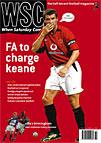 Tony Butcher pays tribute to one of the east coast's scariest spots
Tony Butcher pays tribute to one of the east coast's scariest spots
Now what is the professional footballer’s favourite phrase to describe the joy of playing in the Premiership? “No disrespect to the likes of Grimsby but…” It isn’t just the name, it’s the ground, the small, cold, but above all old Blundell Park, the home of the Mariners since 1899.
Who needs a new ground? New and shiny does not always equal better. Superficial glamour to please the occasional daytripper, all glitz and no substance. Is there anything more depressing than a quarter-full concrete bowl? Do televisions in the bar, efficient catering and toilets with not only running water but an ample collection of towels lead to a higher standard of football? Frankly it doesn’t matter, as long as your team wins. And anything which encourages the opposition to falter and fumble will do.
No one likes visiting Blundell Park to play football. The opposing team’s hearts must sink as their luxury cruiseliner crawls up Grimsby Road, turns left up a pencil thin residential street, then makes a painful 90 degree turn. Terraced housing, bleak views across the Humber, a patch of dirt to stumble over before running into a small, rickety stand as the biting easterly wind dismantles their expensive coiffures. Then they emerge into a tiny stadium with five or six thousand people baying at them from just a few feet away.
It’s worth ten points a season, at least – in other words, the difference between relegation and survival. You can see it in the opposition’s faces as they trot out and in their performances as they crumble. Players from bigger clubs hate going to small, old grounds. We know they do, because they always moan about “wet Tuesdays in Grimsby” and our own players have admitted they feared coming to Blundell Park when at previous clubs.
And the Pontoon Stand is the dankest nether region of the footballing soul: 16 rows of seats, a couple of big red pillars blocking the view. Somehow to us they are invisible, we can see through the metal, just like we see through dilettante players. A bear pit when it was an all-standing, all-singing incline, since seats have been installed it broods silently like a sullen child. Roused, it is a fearsome monster that forces the Town players forward through sheer willpower. Flights of fancy? Nope, the evidence is there, in black and white.
The stand itself creates a particular atmosphere that changes the behaviour of our striped heroes and their opponents. The return of Alan Buckley as manager of West Brom in November 1995, complete with a team full of former (and future) Grimsby players, was one such occasion. A seething mass of venomous passion forced the Town players on. The winner, courtesy of the most famous Italian to set foot in north-east Lincolnshire, Ivano Bonetti, in what was supposedly his last match, caused many in the Pontoon to literally hit the roof. I know I did. It hurt too – the following day. Ninety minutes of frenzied exhortation, the noise rolled around the stand, built up a sonic wave that battered the opponents behind the ear. Most of the West Brom players knew what to expect, but couldn’t halt the rolling thunder.
Just an isolated incident? No. The last two seasons have seen Town in a terrible pickle in March, adrift in the bottom three. In 2001, we met our relegation rivals Tranmere at home. At half-time Town were 1-0 down, the crowd despondent, relegation seemingly 45 minutes away. One spark, in this case Steve Livingstone’s full-frontal assault on their keeper, and the Kraaken awoke. The Pontoon gave a bravura 45-minute performance and three goals went into the net.
A week later exactly the same thing happened. Losing at half time to an uninterested Watford, an all-or-nothing rampaging performance in the second half, which relied on anything but skill, brought three more points. What made the players do it? The crowd, and especially the Pontoon. But last season topped anything seen before. Opponents were crushed, ground into the dirt, traumatised by the sheer exuberance of the football, which directly flowed from the imploring hordes in the Pontoon.
This isn’t a paean of praise for a bygone age. This is now, this is Town, this is what will be lost if Grimsby move to the concrete bungle. Both sets of players can hear everything we, the Pontoonites, say; the insults, the jokes, the praise. The football experience is not about being nice, it’s about passion, a shared sense of place, a communal spirit. It isn’t a tea party where you want your guests to feel welcome and leave happy. It’s “our” home, not “your” cosy dinner date. Like it, or lump it, it is what it is. We should all cherish the individuality, and no one else has the Pontoon.
From WSC 188 October 2002. What was happening this month